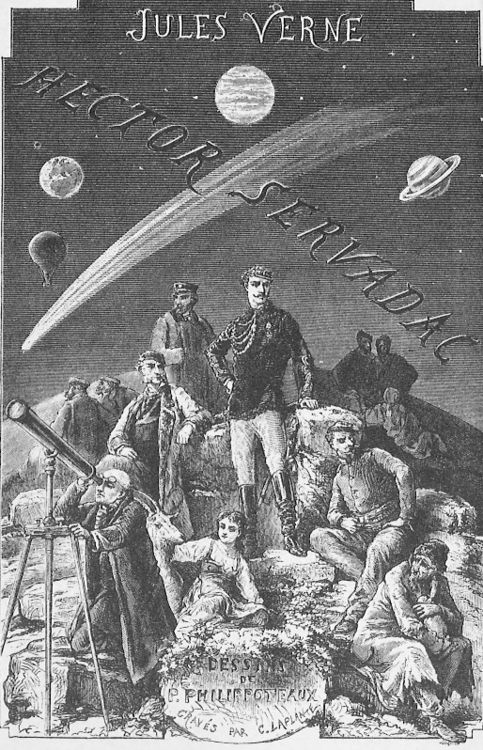Jules Verne, Off on a Comet (Hector Servadac), 1877
|
Anti-Semitism was a common element in late nineteenth-century
French culture to an extent that is shocking today.
Below are several passages from the original English
translation of Hector Servadac a novel by Jules Verne, one of
the chief founders of modern science fiction.
In the original 1877 version of the novel, which was
serialized in a magazine for young people, the description of a
Jewish character contained all of the negative stereotypes that
were repeated endlessly in French culture at the time.
This figure is named Isaac Hakkabut, but that name is
rarely used in the novel, and, instead, he is almost always
called “the Jew,” thereby implying that his personal qualities
are universal characteristics of all members of his ethnic
group. He is
described as ugly and anti-social, and his function in the story
is chiefly as the subject of jokes about how greedy he is. The chief rabbi of Paris complained that the anti-Semitic imagery was very inappropriate, particularly in a publication aimed at young people, and Verne’s publisher made minor changes for the later editions, primarily substituting the character’s name for “the Jew.” The English translation, however, was based on the serialized version.
Here are a few of the more
objectionable passages. |
He took the cue, and promptly ordered the Jew to
hold his tongue at once. The man bowed his head in servile submission, and folded his hands upon his breast.
submission, and folded his hands upon his breast.
Servadac surveyed him leisurely. He was a man of
about fifty, but from his appearance might well have been taken for at
least ten years older. Small and skinny, with eyes bright and cunning, a
hooked nose, a short yellow beard, unkempt hair, huge feet, and long
bony hands, he presented all the typical characteristics of the German
Jew, the heartless, wily usurer, the hardened miser and skinflint. As
iron is attracted by the magnet, so was this Shylock attracted by the
sight of gold, nor would he have hesitated to draw the life-blood of his
creditors, if by such means he could secure his claims.
His name was Isaac Hakkabut, and he was a
native of Cologne. Nearly the whole of his time, however, he informed
Captain Servadac, had been spent upon the sea, his real business being
that of a merchant trading at all the ports of the Mediterranean. A
tartan, a small vessel of two hundred tons burden, conveyed his entire
stock of merchandise, and, to say the truth, was a sort of floating
emporium, conveying nearly every possible article of commerce, from a
lucifer match to the radiant fabrics of Frankfort and Epinal. Without
wife or children, and having no settled home, Isaac Hakkabut lived
almost entirely on board the Hansa,
as he had named his tartan; and engaging a mate, with a crew of three
men, as being adequate to work so light a craft, he cruised along the
coasts of Algeria, Tunis, Egypt, Turkey, and Greece, visiting, moreover,
most of the harbors of the Levant. Careful to be always well supplied
with the products in most general demand—coffee, sugar, rice, tobacco,
cotton stuffs, and gunpowder—and being at all times ready to barter, and
prepared to deal in secondhand wares, he had contrived to amass
considerable wealth. . . .
----
The count turned his back in disgust, while the
Jew sidled up to little Nina and muttered in Italian. “A lot of lies,
pretty one; a lot of lies!”
“Confound the knave!” exclaimed Ben Zoof; “he
gabbles every tongue under the sun!”
“Yes,” said Servadac; “but whether he speaks
French, Russian, Spanish, German, or Italian, he is neither more nor
less than a Jew.” . . .
----
A month passed away. Gallia continued its course, bearing its little
population onwards, so far removed from the ordinary influence of human
passions that it might almost be said that its sole ostensible vice was
represented by the greed and avarice of the miserable Jew.